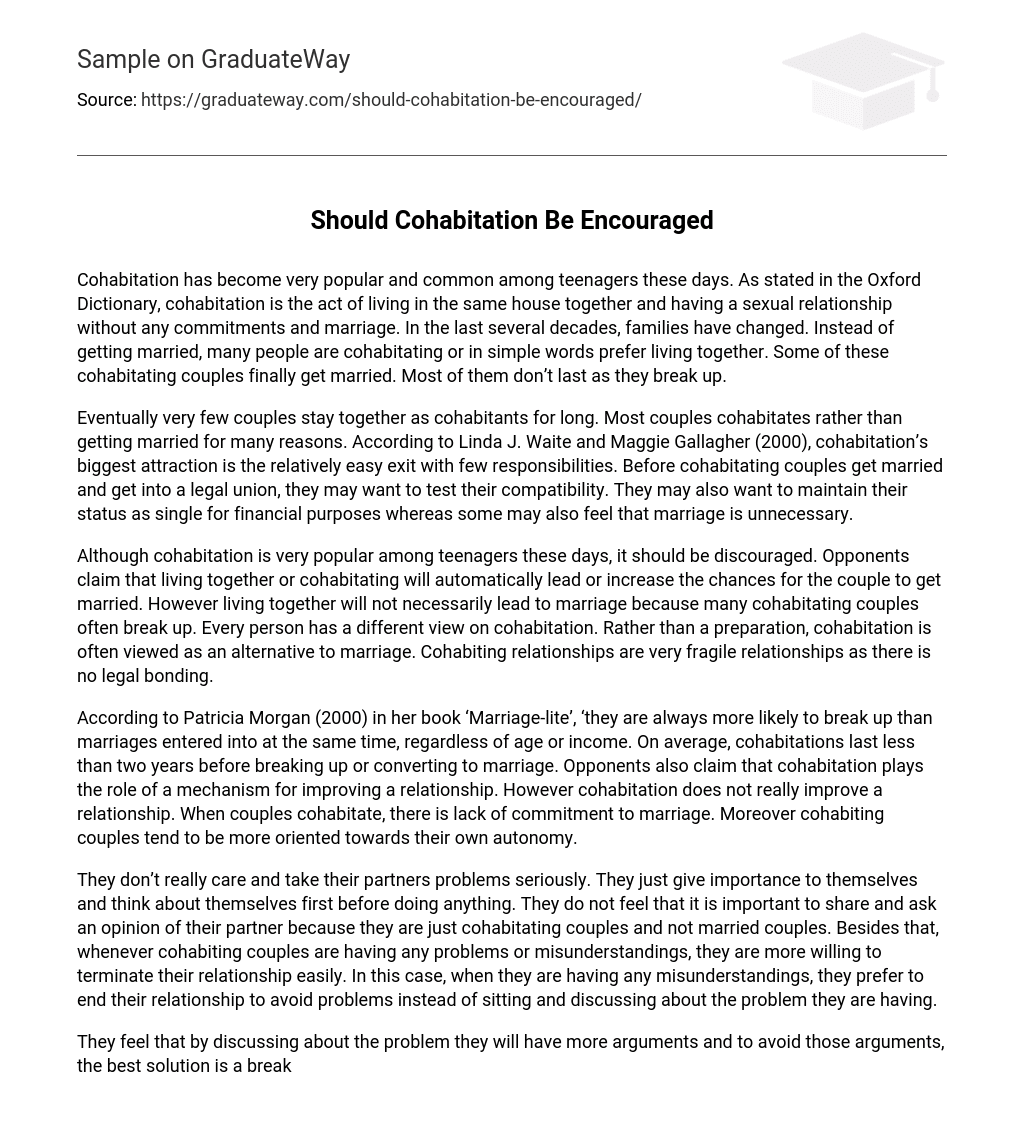According to the Oxford Dictionary, cohabitation refers to living together and engaging in a sexual relationship without being married. Recent trends indicate that teenagers are increasingly choosing cohabitation instead of marriage. This shift in family dynamics has led to a rise in the number of couples who reside together, although unfortunately, many of these relationships ultimately end in separation.
According to Linda J. Waite and Maggie Gallagher (2000), the majority of couples choose cohabitation over marriage because it allows them to easily end the relationship without taking on significant responsibilities. Cohabiting couples may wish to assess their compatibility before getting legally married, while some prefer remaining single for financial reasons or do not see a need for marriage.
Although cohabitation is a widely chosen option for teenagers, it should be discouraged. Critics claim that living together will inevitably lead to marriage or increase the chances of it. Nevertheless, many couples who cohabit actually end up separating, suggesting that cohabitation does not always result in marriage. Opinions on cohabitation vary significantly, with some considering it as an alternative to marriage rather than a progression towards it. Furthermore, the absence of legal commitment renders cohabiting relationships unstable.
According to Patricia Morgan (2000) in her book ‘Marriage-lite’, she asserts that cohabitations have a greater probability of ending in a breakup compared to marriages with the same duration, irrespective of age or income. On average, cohabitations tend to endure for less than two years before either separation occurs or they progress into marriage. Critics additionally contend that the purpose of cohabitation is to improve relationships; however, this claim is not entirely accurate. Couples who choose to live together often lack a sincere dedication to marriage and frequently prioritize their personal autonomy.
One significant obstacle for cohabiting couples is their failure to prioritize and empathize with their partner’s problems. Their self-centeredness prevents them from recognizing the importance of sharing and seeking their partner’s perspective. Additionally, they often view each other as simply cohabiting rather than fully committed in marriage. Furthermore, instead of actively communicating and resolving issues when faced with challenges or misunderstandings, these couples are more inclined to terminate the relationship.
The general belief is that talking about the issue leads to more arguments and, in order to avoid those arguments, breaking up is considered the best option. A study conducted by Casey Copin (1998) and her team suggests that living together before marriage raises the likelihood of divorce. However, critics argue that cohabitation actually strengthens subsequent marriages and decreases the risk of divorce. Nevertheless, for couples who choose to remain living together after cohabitation and eventually marry, the probability of divorce continues to increase.
In his article ‘Cohabitation Makes Disengaged Bedfellows’ (Washington Times, 23 March 1999), Wade Horn (1999) suggests that rather than being a solution for marriage issues, cohabitation is actually the root problem. According to Horn’s viewpoint, when couples decide to live together before marriage, the excitement and novelty in their relationship diminish once they officially tie the knot. They become overly accustomed to each other and eventually become weary of the relationship. Furthermore, cohabitation also increases the chances of unplanned pregnancies and children being born outside of wedlock.
Living together as a couple inevitably brings about heightened intimacy, but it can also bring unforeseen outcomes. One such outcome is the possibility of pregnancy, which may lead the couple to opt for termination if they feel overwhelmed by the associated responsibilities. Conversely, couples desiring parenthood may choose to part ways, resulting in a single-parent family dynamic. Ultimately, breakups and divorces stemming from cohabitation contribute to both fractured marriages and households headed by a single parent. These circumstances greatly influence the emotional and behavioral growth of the child.
According to David Popenoe (1999), children living with single parents are twice as likely to develop a mental disorder compared to those living with married or cohabiting couples. Cohabitation is increasingly popular among teenagers, and many choose to live with their partners. However, they may not be aware of the potential consequences if the relationship ends. Teenagers may decide to cohabitate in order to share expenses or better understand their partner, but fail to realize that cohabitation is not an effective way to achieve these goals. When the relationship fails, it can seriously impact the partner’s mental health and make it difficult for them to move on from the separation. In conclusion, cohabitation poses numerous problems for teenagers and can lead to broken marriages and single-parent households, highlighting the importance of discouraging this practice.





